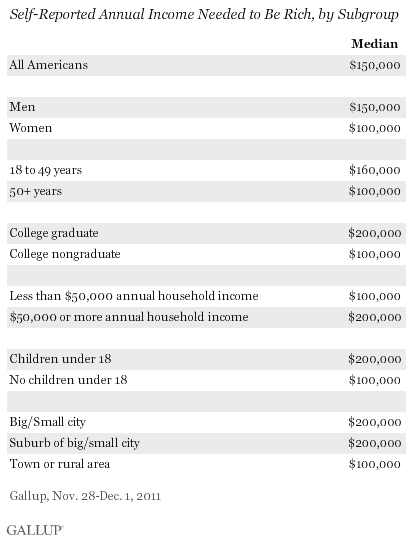PRINCETON, NJ -- Americans say they would need to earn a median of $150,000 a year to consider themselves rich. However, 30% say less than $100,000 would be enough, including 18% who would consider themselves rich if they made less than $60,000 a year. On the other hand, 15% say they would need to earn at least $1 million per year before thinking of themselves as rich.
![Just thinking about your own situation, how much money per year would you need to make in order to consider yourself rich? [OPEN-ENDED] November-December 2011](http://content.gallup.com/origin/gallupinc/GallupSpaces/Production/Cms/POLL/pb6ugzdyhk6wcswgbhuqcw.gif)
The results are based on a Nov. 28-Dec. 1 Gallup poll. The question of who is "rich" in the United States has been frequently discussed during the past few years as the nation's policymakers debate income-tax and deficit-reduction policies. Additionally, the Occupy Wall Street protests have focused their attention on the wealthiest 1% of Americans. The poll results suggest Americans would need quite a bit less than what the wealthiest 1% of Americans earn to consider themselves rich.
Americans' perceptions of the annual income they need to be rich are a bit higher than in 2003, when Gallup last asked the question. Then, $120,000 a year was the median amount Americans said they would need to make in order to think of themselves as rich.
According to the U.S. Census Bureau, the median annual household income in the United States is roughly $50,000 per year. The Gallup poll finds those below that level typically saying they would need to earn $100,000 or more in annual income to be rich. Those at or above that level typically report they would need to earn $200,000 a year to be rich, which expands to $250,000 among those well above the U.S. median income ($75,000 or more in annual household income).
The poll also finds higher estimates of the annual income needed to be rich among men than among women; estimates are also higher for younger vs. older Americans, and college graduates vs. college nongraduates. The typical parent of minor children believes he or she would need to make more money to be rich than does the typical American without minor children. Additionally, urban and suburban residents believe they would need more to be rich than do those residing in towns or rural areas.

Americans Believe $1 Million Net Worth Would Make Them Rich
A separate question in the poll asked Americans how much net worth, or savings in cash, stocks, real estate, and other investments, they would need to consider themselves rich. The median figure Americans give is $1 million, the same as in Gallup's 2003 poll asking the same question.
Currently, 26% of Americans say they would need in excess of $1 million in savings in order to consider themselves rich, including 14% who say $5 million or more. At the other end of the spectrum, 13% would consider themselves rich with less than $100,000 in savings.
![Just thinking about your own situation, how much money would you need to have saved up in cash, stocks, real estate and other investments in order to consider yourself rich? [OPEN-ENDED] November-December 2011](http://content.gallup.com/origin/gallupinc/GallupSpaces/Production/Cms/POLL/_0ixgaana0-ss16zhehqsa.gif)
Estimates of the amount of savings a person needs to be rich are generally similar by subgroup, though college graduates report a median of $1 million and college nongraduates of $500,000.
Implications
Americans generally would consider themselves rich if they made $150,000 per year or had $1 million in net worth. That seems to differ a bit from the federal government's definition of rich. For example, the federal government's top tax bracket of 35% begins with individuals and married couples earning $379,000 or more annually. Also, when Congress debated extending the 2001-2003 federal income tax cuts, the debate centered around whether to extend those for single Americans earning $200,000 and couples earning $250,000 or more per year.
The question of the point at which someone becomes rich certainly has policy implications in the United States. Gallup finds Americans now about evenly divided on whether the rich, broadly speaking, should be heavily taxed. At the same time, Americans usually show widespread support for higher taxes on upper-income Americans to pay for specific programs such as those designed to create jobs, reduce the deficit, and pay for the healthcare legislation.
Survey Methods
Results for this Gallup poll are based on telephone interviews conducted Nov. 28-Dec. 1, 2011, with a random sample of 1,012 adults, aged 18 and older, living in all 50 U.S. states and the District of Columbia.
Each question reported here is based on a random half-sample of approximately 500 national adults. For results based on these samples, one can say with 95% confidence that the maximum margin of sampling error is ±5 percentage points.
Interviews are conducted with respondents on landline telephones and cellular phones, with interviews conducted in Spanish for respondents who are primarily Spanish-speaking. Each sample includes a minimum quota of 400 cell phone respondents and 600 landline respondents per 1,000 national adults, with additional minimum quotas among landline respondents by region. Landline telephone numbers are chosen at random among listed telephone numbers. Cell phone numbers are selected using random-digit-dial methods. Landline respondents are chosen at random within each household on the basis of which member had the most recent birthday.
Samples are weighted by gender, age, race, Hispanic ethnicity, education, region, adults in the household, and phone status (cell phone only/landline only/both, cell phone mostly, and having an unlisted landline number). Demographic weighting targets are based on the March 2010 Current Population Survey figures for the aged 18 and older non-institutionalized population living in U.S. telephone households. All reported margins of sampling error include the computed design effects for weighting and sample design.
In addition to sampling error, question wording and practical difficulties in conducting surveys can introduce error or bias into the findings of public opinion polls.
View methodology, full question results, and trend data.
For more details on Gallup's polling methodology, visit www.gallup.com.
